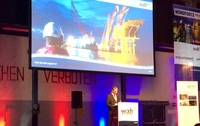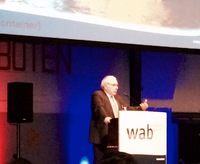News Release from windfair.net
Wind Industry Profile of
Germany: Windforce 2016 shows - Fear is spreading – despite good numbers
"The 'Energiewende' is not possible without the generation of electricity out on the sea. In this area German know-how has a worldwide reputation. Both taken into consideration, this should bring us motivation and let us be optimistic about the future." These words were written as a greeting towards the participants of the Windforce conference by the two organizers, Andreas Wellbrock of WAB and Jens Eckhoff of Offshore Wind Fair and Event GmbH,
Not much of that feeling was evident at the opening ceremony of the conference on Tuesday, however. Andreas Wellbrock took the opportunity in his opening speech and renewed the WAB criticism towards the EEG 2016 (the German energy transition law), which has been approved by the German Cabinet just yesterday: "The government is missing a master plan for the energy transition!"

However, the future is currently uncertain. Grid expansion is still not happening fast enough. The development of wind energy has been slowed down by that for long and will be for the coming years in the EEG 2016. According to Wellbrock that’s a mistake, because it is unfair that one has to suffer because others did not comply with their work. He also questions the monopoly of the grid operators, because there is no incentive to accelerate the construction of power lines. Here more pressure must be made by competition. Currently however, an "energy transition brake" is in use.

According to Beckmeyer, previous CDU-FDP government is to blame. Though triggering the energy transition with the nuclear phase-out, they approved an unguided sprawl of renewable energy at the same time. Today the government would have to make sure that the various branches of industry are not endangered by the expansion targets of the renwable energies – he also included the fossil energy industry here where jobs were at risk and could threaten a blackout in Germany, if not taken into account. "We all must make an effort," he urged.
At least this advice was followed by the participants on Wednesday and today. During 12 sessions with over 60 speakers, all aspects of offshore wind industry were considered. And even the new EEG 2016 got its own session with talks on the policy framework. So the effort was made – at least by the industry.
- Author:
- Katrin Radtke
- Email:
- kr@windmesse.de

